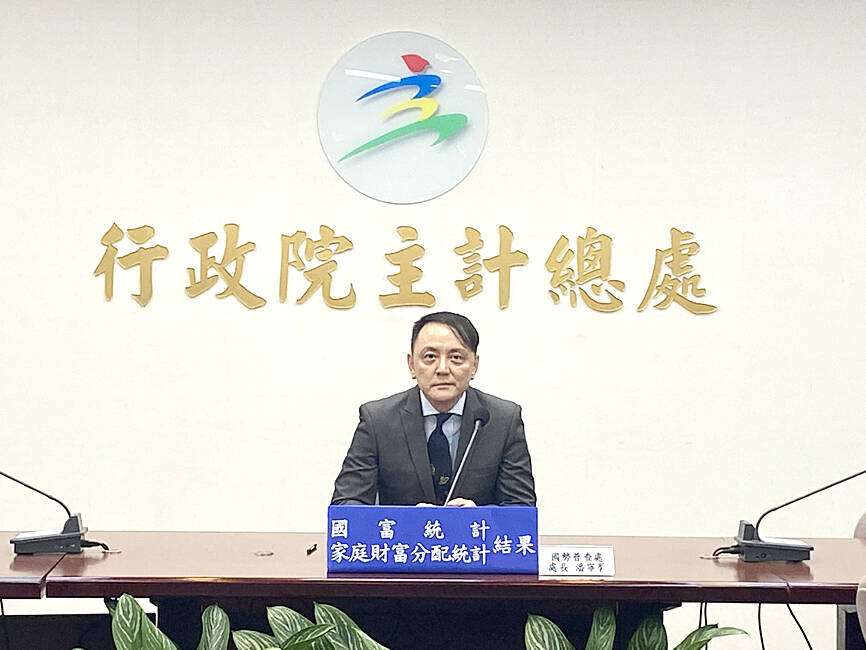Taiwan’s average wealth per household was NT$16.38 million (US$503,102) at the end of 2021, with about 71 percent of households coming in below the average, the Directorate-General of Budget, Accounting and Statistics (DGBAS) said yesterday.
Median wealth per household was NT$8.94 million, said the agency, which released the data for the first time in 30 years.
The Gini coefficient for Taiwanese households — a measure of inequality where zero indicates complete equality of wealth and one indicates complete inequality — was 0.606 at the end of 2021, lower than Australia’s 0.611, the UK’s 0.620, Japan’s 0.678, France’s 0.676 and Germany’s 0.727, the agency said in a report.

Photo: Clare Cheng, Taipei Times
The average wealth among the top 20 percent of Taiwanese households was NT$51.33 million in 2021, accounting for 62.68 percent of total household wealth, while the average for the bottom 20 percent was NT$770,000, or 0.94 percent of the total, the data showed.
As a result, the average household wealth for the top 20 percent was 66.9 times higher than for the bottom 20 percent, lower than Australia’s 93.1 times, the UK’s 109.5, South Korea’s 140.1 and France’s 627.4, meaning that household wealth distribution is relatively even in Taiwan, the DGBAS said.
The last time the DGBAS released a wealth distribution report was in 1992. The agency has not released a similar report since then because data was difficult to come by due to the need for personal information, it said.
Unlike the previous report, which was based on a survey of households the previous year, the latest report was compiled using surveys of family income and expenditure, along with other household data such as assets and liabilities, the agency said, urging caution when making comparisons as the two reports used different data collection and statistical methods.
In the previous report, the average household wealth was NT$5.26 million in 1991, with the top 20 percent’s wealth 16.8 times higher than that of the bottom 20 percent, while the Gini coefficient was 0.47 at that time, DGBAS data showed.
The widening gap in wealth disparity is inevitable in free economies, but Taiwan's wealth inequality is less severe than in many other countries, DGBAS Census Department Director Pan Ning-hsin (潘寧馨) said at a news conference yesterday.
The agency yesterday also reported that Taiwan’s gross national wealth was NT$310.61 trillion at the end of 2022, an increase of NT$26.18 trillion, or 9.2 percent, from the end of 2021, while net national wealth was NT$247.14 trillion, also an increase of NT$21.72 trillion, or 9.63 percent, from a year earlier.
National wealth statistics represent the current value of all goods owned by the people in a nation at the end of year, the agency said.
Gross national wealth is the total value of net assets on current prices owned by five sectors: households, non-profit institutions, non-financial enterprises, financial enterprises and government, and net national wealth represents the assets value of gross national wealth with depreciation being deducted, it said.
At the end of 2022, the net worth — assets minus liabilities — of the household sector was NT$159.08 trillion, accounting for 64.37 percent of the net worth of all sectors, the report showed.
Additional reporting by CNA

A magnitude 7.0 earthquake struck off Yilan at 11:05pm yesterday, the Central Weather Administration (CWA) said. The epicenter was located at sea, about 32.3km east of Yilan County Hall, at a depth of 72.8km, CWA data showed There were no immediate reports of damage. The intensity of the quake, which gauges the actual effect of a seismic event, measured 4 in Yilan County area on Taiwan’s seven-tier intensity scale, the data showed. It measured 4 in other parts of eastern, northern and central Taiwan as well as Tainan, and 3 in Kaohsiung and Pingtung County, and 2 in Lienchiang and Penghu counties and 1

A car bomb killed a senior Russian general in southern Moscow yesterday morning, the latest high-profile army figure to be blown up in a blast that came just hours after Russian and Ukrainian delegates held separate talks in Miami on a plan to end the war. Kyiv has not commented on the incident, but Russian investigators said they were probing whether the blast was “linked” to “Ukrainian special forces.” The attack was similar to other assassinations of generals and pro-war figures that have either been claimed, or are widely believed to have been orchestrated, by Ukraine. Russian Lieutenant General Fanil Sarvarov, 56, head

SAFETY FIRST: Double the number of police were deployed at the Taipei Marathon, while other cities released plans to bolster public event safety Authorities across Taiwan have stepped up security measures ahead of Christmas and New Year events, following a knife and smoke bomb attack in Taipei on Friday that left four people dead and 11 injured. In a bid to prevent potential copycat incidents, police deployments have been expanded for large gatherings, transport hubs, and other crowded public spaces, according to official statements from police and city authorities. Taipei Mayor Chiang Wan-an (蔣萬安) said the city has “comprehensively raised security readiness” in crowded areas, increased police deployments with armed officers, and intensified patrols during weekends and nighttime hours. For large-scale events, security checkpoints and explosives

‘POLITICAL GAME’: DPP lawmakers said the motion would not meet the legislative threshold needed, and accused the KMT and the TPP of trivializing the Constitution The Legislative Yuan yesterday approved a motion to initiate impeachment proceedings against President William Lai (賴清德), saying he had undermined Taiwan’s constitutional order and democracy. The motion was approved 61-50 by lawmakers from the main opposition Chinese Nationalist Party (KMT) and the smaller Taiwan People’s Party (TPP), who together hold a legislative majority. Under the motion, a roll call vote for impeachment would be held on May 19 next year, after various hearings are held and Lai is given the chance to defend himself. The move came after Lai on Monday last week did not promulgate an amendment passed by the legislature that